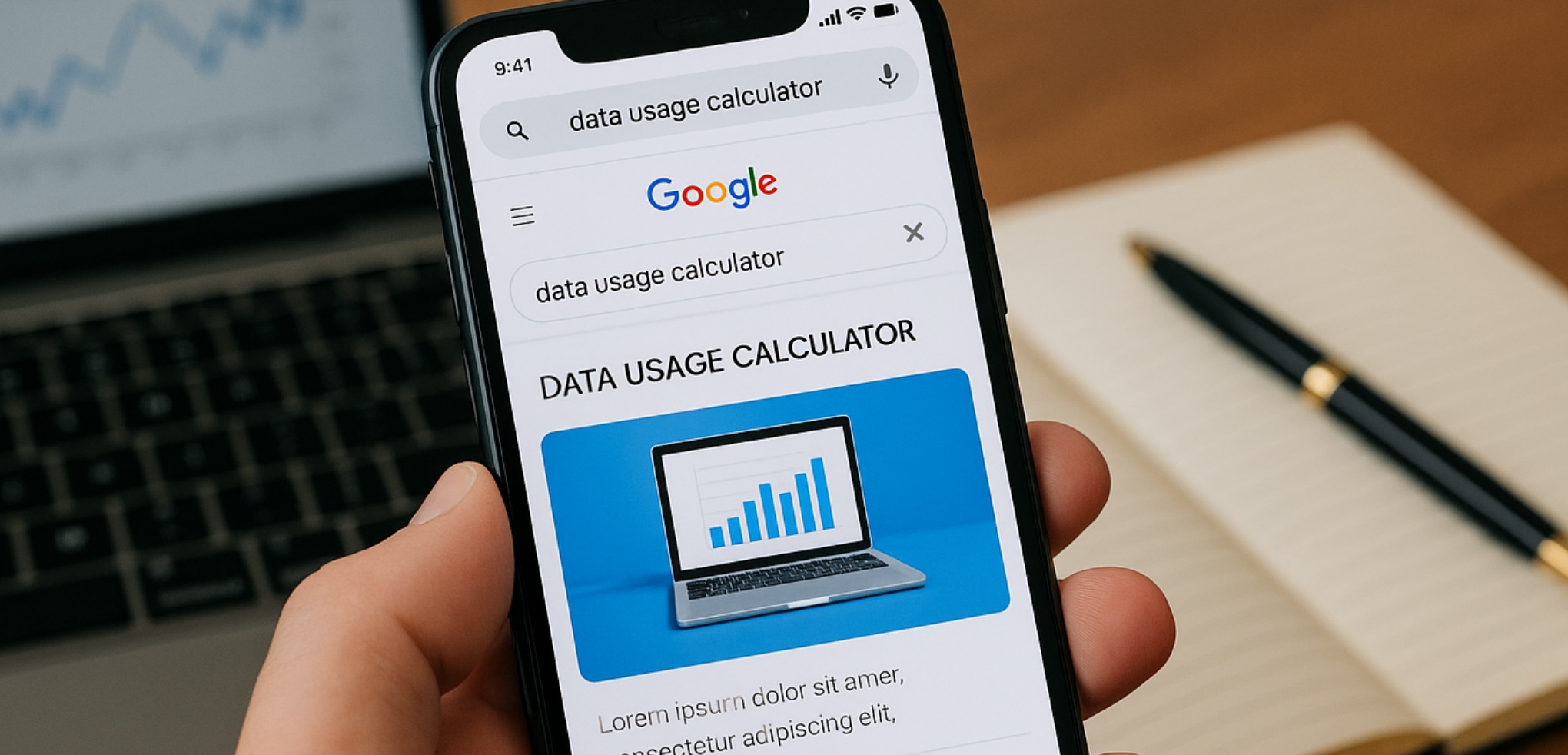How to Use a Data Usage Calculator (and Finally Stop Paying for Overages)

If you’ve ever received a surprise bill because you went over your mobile or internet data limit, you know how frustrating it can be. Between streaming, browsing, gaming, and social media, it’s easy to underestimate how much data you actually use each month.
The good news? You can take control of your data consumption before it becomes a problem — simply by using a data usage calculator.
In this guide, we’ll explain what a data usage calculator is, how to use it effectively, and share practical tips to help you stay within your plan’s limits. By the end, you’ll have a clear understanding of how to manage your data smarter and avoid paying more than you should.
What Is a Data Usage Calculator?
A data usage calculator is a simple yet powerful tool that helps you estimate how much data you need based on your daily online activities. Whether you stream movies, play games, or work remotely, this calculator breaks down how much data each task consumes so you can plan your monthly usage more accurately.
For instance, streaming HD videos for two hours a day can use up to 6GB per week — something many users don’t realize until they get hit with an overage fee.
You can easily try one out using this data usage calculator. It allows you to enter details like how often you stream, browse, or use social media, and then shows you an estimated total of your monthly data needs.
By knowing your usage ahead of time, you can choose a plan that fits your lifestyle and avoid unexpected charges.
Why You Should Use a Data Usage Calculator
Understanding your data consumption isn’t just about avoiding overages — it’s also about saving money and making your internet plan work for you.
Here’s why using a data usage calculator is worth your time:
1. Avoid Overages and Hidden Fees
The most obvious benefit is preventing surprise charges. Many internet service providers (ISPs) and mobile carriers charge extra when you exceed your data limit. A calculator helps you predict your usage, so you can stay comfortably within your plan.
2. Save Money Every Month
Once you know how much data you actually use, you can adjust your plan accordingly. Maybe you’re paying for unlimited data you don’t really need — or maybe you’re constantly running over your cap. Either way, accurate usage estimates help you find the most cost-effective option for your household.
If you’re comparing different internet providers, check out our guide on how to find the best cheap internet service for more budget-friendly options.
3. Make Smarter Internet Choices
By understanding which activities use the most data, you can change your habits or settings to optimize your usage. For example, streaming in standard definition instead of 4K can save gigabytes of data every month without much noticeable difference in quality.
How to Use a Data Usage Calculator
Using a data usage calculator is straightforward and doesn’t require any technical know-how. Here’s how to get started:
Step 1: Enter Your Daily Activities
Begin by listing your typical online habits. How many hours do you spend streaming? Do you work from home and attend video meetings daily? How often do you download files or play online games?
Enter these details into the calculator. Each activity will have an average data usage rate — for example, social media browsing might use 150MB per hour, while streaming HD video can use up to 3GB per hour.
Step 2: Estimate Your Monthly Data Usage
Once you’ve entered your daily habits, the calculator will generate an estimate of your monthly data usage. It’s a quick snapshot of how much data your household consumes on average.
You’ll likely be surprised at how much certain activities add up — especially streaming and cloud backups.
Step 3: Adjust for Apps and Devices
Different apps and devices use different amounts of data. For example, Netflix or YouTube on your smart TV will consume far more data than the same apps on a phone with lower resolution playback.
If you want a more detailed breakdown, check out our article on comparing data usage across popular apps and services — it’s a great resource for understanding which apps are the biggest data hogs.
Tips to Avoid Data Overages
While a calculator helps you estimate usage, managing your data wisely is what keeps your bill under control. Here are a few practical steps to ensure you don’t exceed your limit.
1. Keep an Eye on Background Apps
One of the biggest culprits of wasted data is background activity. Many apps refresh, sync, or download updates even when you’re not actively using them.
To avoid this, turn off automatic updates or background data for non-essential apps. Learn more about managing this in our post on how background apps affect data usage.
2. Connect to Wi-Fi Whenever Possible
Whenever Wi-Fi is available — at home, at work, or in public places — connect to it. Wi-Fi doesn’t count against your mobile data plan, so it’s a simple way to reduce overall usage.
If you’re often on the go, consider setting your phone to automatically connect to trusted Wi-Fi networks to save even more data.
3. Limit High-Data Activities
Streaming in 4K, playing high-end online games, and downloading large files are all data-heavy tasks. Try switching to standard definition for streaming, or download content while connected to Wi-Fi so you can enjoy it offline later.
This one simple change can save several gigabytes a month — enough to prevent most overages.
4. Set Data Alerts and Limits
Most carriers and ISPs allow you to set alerts when you reach certain percentages of your data cap — such as 80% or 90%. These notifications give you time to adjust your usage before overage fees kick in.
You can also manually set data limits on your device to automatically restrict usage once you hit a threshold. It’s a proactive way to stay in control.
5. Choose the Right Plan for Your Lifestyle
If you find that you’re constantly running out of data, it might be time to upgrade your plan. On the flip side, if you consistently use far less than your limit, you could save money by switching to a smaller plan.
Compare different packages and look for plans that match your typical usage habits. Use the data usage calculator regularly to reassess your needs — especially if your online habits change over time.
Bonus Tip: Educate Your Household
If you share your internet plan with family or roommates, make sure everyone understands how their activities affect the total data usage. Encourage them to connect to Wi-Fi, turn off automatic video playback on social media, and limit HD streaming when possible.
It’s a small effort that can prevent everyone from facing surprise charges at the end of the month.
Final Thoughts
Avoiding data overages isn’t just about cutting back — it’s about being informed. A data usage calculator gives you the power to understand your consumption habits, plan ahead, and make smarter decisions about your internet use.
By combining this tool with everyday habits like using Wi-Fi, limiting high-data activities, and keeping background apps in check, you’ll never have to worry about unexpected fees again.
Start taking control of your data today with this easy-to-use data usage calculator and make sure you’re getting the best value from your internet plan.
Related Posts

Fri, Jan 16, 2026 9:17 PM
SubscriptionSpectrum WiFi Extenders Explained: Coverage Without the Headaches
Learn how Spectrum WiFi Extenders work, what they cost, and whether renting extenders or buying your own mesh WiFi system makes more sense.

Thu, Jan 15, 2026 3:58 AM
TechnologySimple Ways to Browse the Internet Faster Without the Frustration
Learn practical ways to browse the internet faster by optimizing your browser, DNS, router, and connection for smoother, more reliable web performance.

Thu, Jan 15, 2026 1:15 AM
Technology SafetyHow to Protect yourself from the Dangers of Public Wi-fi
Wi-Fi clients are in danger from programmers or hackers, yet luckily there are shields against them. The ongoing blast of free

Wed, Jan 14, 2026 10:51 PM
Internet BundlesThe Best Free TV and Movie Streaming Services 2026
Discover the best free TV and movie streaming services. Enjoy on-demand movies, live channels, and cable alternatives without spending a dime.

Wed, Jan 14, 2026 9:53 PM
WifiUnderstanding WiFi Calling: Stay Connected Anywhere
Learn how WiFi calling works, its benefits, and how to set it up for reliable, cost-effective mobile communication at home or while traveling.